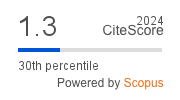Antioxidant effect of minocycline in gingival epithelium induced by Actinobacillus actinomycetemcomitans serotype B toxin
Vol. 42 No. 1 (2009): March 2009
Articles
March 1, 2009
Downloads
Setiawati, E. M. (2009). Antioxidant effect of minocycline in gingival epithelium induced by Actinobacillus actinomycetemcomitans serotype B toxin. Dental Journal (Majalah Kedokteran Gigi), 42(1), 41–45. https://doi.org/10.20473/j.djmkg.v42.i1.p41-45
Downloads
Download data is not yet available.
- Every manuscript submitted to must observe the policy and terms set by the Dental Journal (Majalah Kedokteran Gigi).
- Publication rights to manuscript content published by the Dental Journal (Majalah Kedokteran Gigi) is owned by the journal with the consent and approval of the author(s) concerned.
- Full texts of electronically published manuscripts can be accessed free of charge and used according to the license shown below.
- The Dental Journal (Majalah Kedokteran Gigi) is licensed under a Creative Commons Attribution-ShareAlike 4.0 International License

















